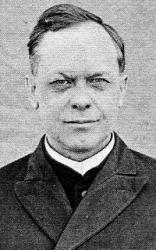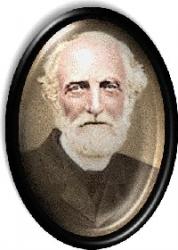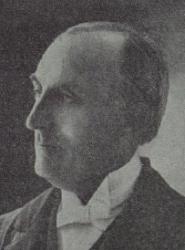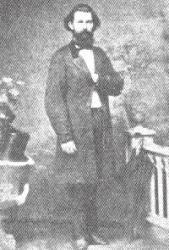Planning worship?
Check out our sister site, ZeteoSearch.org,
for 20+ additional resources related to your search.
- |
User Links
Person Results
Barney Elliott Warren

1867 - 1951 Person Name: B. E. W. Meter: 10.7.10.7 D Author of "Waiting at the Cross" in Timeless Truths Barney Elliott Warren was an American Christian hymnwriter and minister.
See more in Wikipedia
Barney Elliott Warren
William J. Kirkpatrick

1838 - 1921 Person Name: William James Kirkpatrick Meter: 10.7.10.7 D Composer of "FATHER ALL HOLY" in The Cyber Hymnal William J. Kirkpatrick (b. Duncannon, PA, 1838; d. Philadelphia, PA, 1921) received his musical training from his father and several other private teachers. A carpenter by trade, he engaged in the furniture business from 1862 to 1878. He left that profession to dedicate his life to music, serving as music director at Grace Methodist Church in Philadelphia. Kirkpatrick compiled some one hundred gospel song collections; his first, Devotional Melodies (1859), was published when he was only twenty-one years old. Many of these collections were first published by the John Hood Company and later by Kirkpatrick's own Praise Publishing Company, both in Philadelphia.
Bert Polman
William J. Kirkpatrick
Julia H. Johnston

1849 - 1919 Meter: 10.7.10.7 D Author of "Praise The Redeemer" in The Cyber Hymnal Julia Harriet Johnston, who was born on Jan. 21, 1849, at Salineville, OH, in Columbiana County. Her father was a minister and he mother was a poet. She began writing when she was nine years old but really started writing verse in high school. She lived in Peoria, Ill.
Dianne Shapiro, from "The Singers and Their Songs: sketches of living gospel hymn writers" by Charles Hutchinson Gabriel (Chicago: The Rodeheaver Company, 1916)
Julia H. Johnston
C. W. Naylor

1874 - 1950 Person Name: C. W. N. Meter: 10.7.10.7 D Author of "Opening Song" in Timeless Truths Naylor, Charles Wesley. (1874--1950). C. W. Naylor was born in southern Ohio and reared in Ohio and West Virginia by grandparents. At the age of nineteen he left the Methodist church for the Church of God. He worked for a while at the Gospel Trumpet Company in Grand Junction, Michigan and on some evangelistic tours. He was ordained in 1899 in Springfield, Ohio. He was first injured in 1908 in Florida while moving timbers from under a meeting tent. He suffered a dislocated kidney and other internal injuries. A year later he was in a bus accident that left him an invalid for the rest of his life.
Naylor wrote eight books, many articles and pamphlets, many hymns and gospel songs, besides being a columnist in the Gospel Trumpet.
--John W.V. Smith, DNAH Archives
See also: Neidert, David L. (1985). Reformation's Song: A History of Church of God Music. Anderson, Ind.: the author.
C. W. Naylor
E. E. Hewitt

1851 - 1920 Person Name: Eliza E. Hewitt Meter: 10.7.10.7 D Author of "Father All Holy" in The Cyber Hymnal Pseudonym: Lidie H. Edmunds.
Eliza Edmunds Hewitt was born in Philadelphia 28 June 1851. She was educated in the public schools and after graduation from high school became a teacher. However, she developed a spinal malady which cut short her career and made her a shut-in for many years. During her convalescence, she studied English literature. She felt a need to be useful to her church and began writing poems for the primary department. she went on to teach Sunday school, take an active part in the Philadelphia Elementary Union and become Superintendent of the primary department of Calvin Presbyterian Church.
Dianne Shapiro, from "The Singers and Their Songs: sketches of living gospel hymn writers" by Charles Hutchinson Gabriel (Chicago: The Rodeheaver Company, 1916)
E. E. Hewitt
F. A. Blackmer
1855 - 1930 Person Name: Francis Augustus Blackmer Meter: 10.7.10.7 D Composer of "TALLADEGA" in The Cyber Hymnal Blackmer, Francis Augustus. (Ware, Massachusetts, February 17, 1855--October 8, 1930, Somerville, Massachusetts). Advent Christian musician. His parents, Augustus and Jane Blackmer, were among those caught up in the excitement of the Millerite Movement. One son, Fred, became an Advent Christian minister. Francis, with a talent recognized at an early age, consecrated his own life to Christian service as a musician. He was immersed in baptism at the Adventist campmeeting in Springfield, Massachusetts, by Elder Miles Grant.
His early years were spend in central Massachusetts, his schooling at Wilbraham Academy. He was largely self-taught in harmony and musical composition. He wrote the words and music to his first gospel song, "Out on the fathomless sea," at the age of sixteen. Altogether he wrote over 300 gospel songs about the Second Coming, witnessing and working for the Lord, and praises to God's Holy Name. A few of these have circulated widely outside his own denomination. His final text, "I shall see him, And be like him," came when he was so weak that his friend, Clarence M. Seamans, had to supply the music. He used the pseudonym, A. Francis, with some of his early songs.
Blackmer's first anthology was The Gospel Awakening, (1888). Subsequent gospel songbooks with which he was associated were: Singing by the Way (1895), Carols of Hope (1906), The Golden Sheaf, No. 2 (1916), and Songs of Coming Glory (1926).
Most of his adult life was spent in Somerville, Massachusetts, a suburb of Boston, where he had a prosperous piano business. In the 1890s, his "Francis A. Blackmer Pianos" were made for him by the Washington Hall Piano Company of Boston. Later, his "Good as Gold Pianos" were manufactured by the Christman Piano Company of New York City and shipped directly to his customers throughout New England.
In Somerville, Blackmer served as choirmaster and song-leader in the Advent Christian Church for many years. He was also an elder of the church until his death. From 1914 until his death, he was songleader at the mid-summer Alton Bay Campmeeting on Lake Winnepesaukee, New Hapshire. There his High Rock Hill was both a salesroom and a summer cottage over the years. He was a member of the board of directors of the campmeeting association for several years. Very popular were his singing sessions on the campground square between suppertim and evening services, and a final sing into the small hours of the night following the final service of the campmeeting.
--Leonard Ellinwood, DNAH Archives
F. A. Blackmer
M. B. C. Slade

1826 - 1882 Person Name: Mary B. C. Slade, 1826-1882 Meter: 10.7.10.7 D Author of "Hark! the Gentle Voice" in Sacred Songs of the Church Mary Bridges Canady Slade USA 1826-1882. Born in Fall River, MA, she was well-educated and became a minister's wife, teacher, and poet. She was assistant editor of The New England Journal of Education. She also authored hymns, Sunday school materials and books on education, primarily used for training teachers. She authored a children's magazine, “Wide-awake”. She and her husband were active in the underground railroad (helping slaves achieve their freedom). She spent her whole life living in the same town.
John Perry
M. B. C. Slade
Arthur T. Pierson

1837 - 1911 Meter: 10.7.10.7 D Author of "Advent Song" in The Cyber Hymnal Rv Arthur Tappan Pierson DD USA 1837-1911. Born at New York City, NY, he professed faith in Christ at age 13 upon attending a Methodist revival meeting. He was educated at Hamilton College, Clinton, NY, (1857), and Union Theological Seminary (1869). He married Sarah Frances Benedict in 1860, and they had seven children: Helen, Laura, Louise, Delavan, Farrand, Edith, and Anna. He entered Presbyterian ministry in 1860. He pastored successfully at the Congregational Church, Winsted, CT, (summers of 1859 & 1869), Binghampton, NY (1860-1863), Waterford, NY (1863-1869) Fort Street Presbyterian Church, Detroit, M (1869-1882)I, and at Bethany Presbyterian Church, Philadelphia, PA (1883-1889), where he ran a missionary training school and developed a national reputation as a promoter of missions. While at Detroit, the largest Presbyterian Church in town, the church burned down in 1876, and services were held in a local opera house. Pierson realized he had become prideful and greedy, seeking approval of the rich. As a result, he led his wealthy congregation to reach out to the poor of Detroit. He banished the practice of pew rents, and committed to accepting his salary on a faith basis. A revival broke out as a result. In 1885, at a Bible conference sponsored by D L Moody, Pierson called on Protestant churches to launch a worldwide missionary campaign. In 1886 he authored “The crisis of missions”, the major missions promotional book of the era. He spoke on missions to a group of YMCA collegians at a summer conference convened by Moody in MA. As a result, 100 young men volunteered to be foreign missionaries, and the Student Volunteer Movement for Foreign Missions (SVM) was born. In 1889-90 he nade a missionary tour of the UK. He was editor of the ‘Missionary Review of the world’ (1888-1911), and he lectured on missions at Rutgers College in 1891 and was Duff lecturer in Scotland in 1892. He was a consulting editor for the original “Scofield Reference Bible” (1909), for his friend, C I Scofield. He was also a friend of Dwight L Moody, George Muller, Adoniram Judson Gordon, and Charles H Spurgeon, whom he succeeded in the pulpit of the Metropolitan Tabernacle, London, England, 1891-1893, when Spurgeon suffered from Bright’s disease and asked him to fill his pulpit while he recovered. When Spurgeon died, Pierson was asked to stay on in the pulpit, which he did for two more years. It is notable that Spurgeon asked Pierson to fill his pulpit, when Pierson, a Presbyterian, had not been baptized as a believer. In 1896 Pierson became convinced that believer baptism was correct, and he was then baptized by Spurgeon’s brother, James, at the age of 58. This caused Pierson’s excommunication from the Presbyterian Church, but he continued to worship as a Presbyterian. Pierson spoke with Moody at the Northfield, England, Conferences, and was also a speaker at the Keswick convention, where holiness piety was promoted. Pierson was influential in convincing several Nobel Peace Prize winners to give their lives to missions. Filling several pulpit positions around the world as an urban pastor, he cared passionately for the poor. He was also a pioneer advocate of faith missions, determined to see the world evangelized in his generation. Prior to 1870 there had been only about 2000 missionaries from the U.S. in full-time service, roughly 10% engaged in work among native Americans. In the 1880s a great movement of foreign missions began, in part due to the work of Pierson. He acted as elder statesman of the student missionary movement and was the leading evangelical advocate of foreign missions in the late 19th century. When liberalism began seeping through mainline denominations, Pierson joined other concerned Christian leaders in publishing “The fundamentals”, a series of booklets designed to answer the critics of Christianity. Because of his apologetic abilities, Pierson was invited to write five of the major articles. Each booklet was distributed freely to pastors throughout America, marking the beginning of the Fundamental-Modernist Controversy in American churches. Eventually the booklets were combined into a twelve volume set, available today as a five-volume set. Pierson was called “the Father of Fundamentalism”. In 1898 he wrote a book, “In Christ Jesus”, concluding that a preposition followed by a proper name was the key to understanding the entire New Testament. He was an advocate of ‘day-age creationism’. He pastored at Christ Church, London, England (1902-1903). After retiring, he continued to preach at churches at home and abroad. He visited Korea in 1910 where he taught the Bible in a few churches and was instrumental in founding the Pierson Memorial Bible Institute (presently Pyeongtaek University). Many pastors and scholars came from it. That year he set out to tour missions in East Asia, but grew ill and returned to Brooklyn, NY where he died. It is said that he preached 13,000+ sermons, wrote over 50 books, and he gave Bible lectures as part of a transatlantic preaching ministry that made him famous in Scotland, England, and Korea. All of Pierson’s children professed conversion to Christianity as teens and served as missionaries, pastors, or lay leaders.
John Perry
===========
Pierson, Arthur Tappan, D.D., was born in New York city, March 6, 1837, and educated at Hamilton College. He entered the Presbyterian ministry in 1830, and was pastor successively in Binghampton and in Waterford, New York, and Fort Street, Detroit; his last charge being the Bethany Presbyterian Church, Philadelphia. (Duffield's English Hymns, 1886, p. 576.) Dr. Pierson's hymns include:—
1. Once I was dead in sin. Praise for Salvation.
2. The Gospel of Thy grace. The Love of God in Christ.
3. To Thee, O God [Lord], we raise. Divine Beneficence.
4. With harps and with viols there stand a great throng. The New Song.
Of these hymns, No. 3 is in Hymns and Songs of Praise, N. Y., 1874, and the Laudes Domini, N. Y., 1884; and Nos. 1, 2, 4, are in I. D. Sankey's Sacred Songs and Solos.
-- John Julian, Dictionary of Hymnology (1907)
Arthur T. Pierson
J. H. Rosecrans

1845 - 1926 Person Name: James Holmes Rosecrans Meter: 10.7.10.7 D Composer of "NIGERIA" in The Cyber Hymnal James Holmes Rosecrans studied at the Baxter University of Music in Friendship, New York. After teaching for two years, he joined the Fillmore Brothers Music House in Cincinnati, Ohio. As of 1880, he was teaching music in Douglas County, Colorado. In 1884, was an evangelist in California, and later was associated with evangelistic efforts in Texas, and taught music and Bible at Carlton College in Bonham, Texas. He published over 20 music collections in his lifetime.
© The Cyber Hymnal™ (www.hymntime.com/tch)
J. H. Rosecrans
A. Brooks Everett

1828 - 1875 Person Name: Asa B. Everett, 1828-1875 Meter: 10.7.10.7 D Composer of "[Hark! the gentle voice of Jesus falleth]" in Sacred Songs of the Church Asa Brooks Everett MusDoc USA 1828-1875. Born in VA, he planned to be a doctor, but decided to study music instead. He studied in Boston for four years and also in Leipzig, Germany for four years.. He composed many gospel tunes and edited “The Sceptre” a New York publication. His brothers, Benjamin and Leonard, were also composers. He and Leonard organized a musical instruction system in Richmond, VA, in the 1850s. By 1861, 50 teachers and singing schools were representing them and using their publications. He died in Nashville, TN.
John Perry
A. Brooks Everett


 My Starred Hymns
My Starred Hymns


